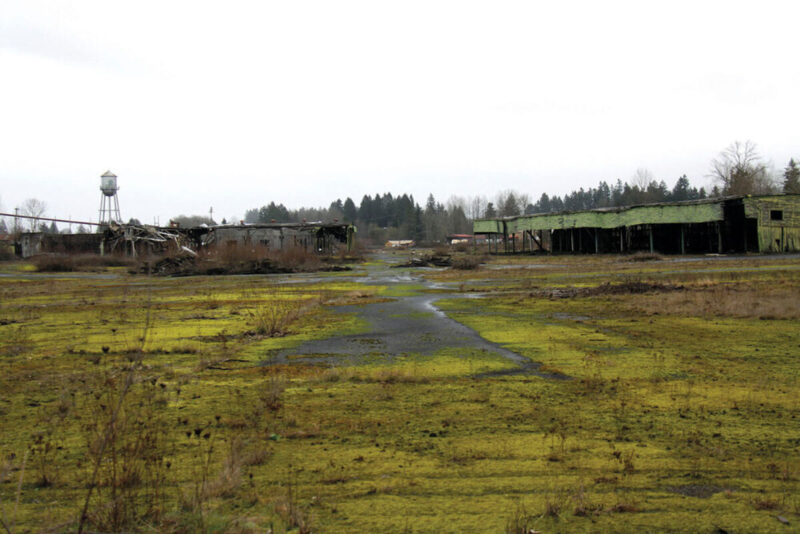The saga of the former Western States Land Reliance Trust properties has included many ebbs and flows since Linn County foreclosed upon the 430-some acres at the end of 2010. Here’s a “brief” summary of some of the journey’s big moments thus far, starting at the beginning:
— Dec. 30, 2010: Linn County forecloses on some 430 acres owned by the Western States Land Reliance Trust, along the north side of Sweet Home, between 18th Avenue and Clark Mill Road.
— August 2012: Sweet Home Economic Development Group and county officials announce a partnership to build a permanent Oregon Jamboree venue on the former Morse Bros.-Knife River rock quarry site at the north end of Clark Mill Road along the south shore of the South Santiam River. WSLRT had proposed a commercial-residential development of the property and successfully had it rezoned from industrial to planned recreation.
Since the foreclosure, the county had been working with the Oregon Department of Environmental Quality and the previous owners, Knife River and Weyerhaeuser, in an effort to clean up the properties. The DEQ has issued a “No Further Action” letter for the Knife River property.
n Summer 2014: Linn County Commission Chair Roger Nyquist urges the Sweet Home Economic Development Group Board of Directors to ask the Linn County Commissioners for the Knife River property instead of allowing the county to develop a park that could be managed as an SHEDG events site, an idea that’s been batted around for a few years.
— February 2015: The County Board of Commissioners agrees in principle to give SHEDG about 220 acres of former quarry property, once owned by Morse Bros. and then by Knife River, generally located between the north edge of town and the south bank of the South Santiam River between 22nd Avenue and Clark Mill Road. It includes some 200 acres.
Members of the SHEDG board of directors had made a formal request on Jan. 27 to the county. Commissioners indicated their interest, but wanted to see concrete details before making a move.
SHEDG’s Board of Directors subsequently seek an agreement with the state Department of Environmental Quality that would limit SHEDG’s liability for environmental cleanup if it assumes ownership of the former Knife River property.
— August 2015: The City of Sweet Home holds a public meeting to gather input from residents and, particularly, mill site neighbors, about what to do with the property. The meeting is the first step of a process, funded by a $350,000 grant from the U.S. Environmental Protection Agency, in which Linn County is moving forward with an environmental assessment on the Weyerhaeuser property.
— Oct. 31, 2015: A Halloween night arson fire, later determined to have been set by a 13-year-old boy, destroys the planer mill facility at the east end of Tamarack Street. More fires, some believed set by transients, have sporadically damaged various buildings on the mill land over the last decade. The fire prompts a hazardous building material survey that confirms the presence of asbestos and lead-based paint, as well as other toxins.
— Fall 2016: Nearly a year after the big mill fire, the county applies for funding to clean up its damage.
— October 2016: SHEDG approaches the City Council with an offer to partner on the Morse Bros./Knife River quarry property just before the arrival of City Manager Ray Towry on Nov. 14.
The Linn County Commissioners agreed the following June to set a 90-day limit on the transfer.
SHEDG members worked with county officials on environmental and legal issues pertaining to the property transfer and began formulating plans for the property, including holding a public meeting to discuss their plans a few weeks after meeting with the commissioners.
SHEDG’s request followed a work session in June that included Commissioner Will Tucker, Sweet Home city councilors, representatives from county and state agencies, as well as private landowners from the Santiam River Development Company, Albany & Eastern Railroad and Desler, the property’s former owner.
— Nov. 28, 2017: Linn County Commissioners approve the transfer of the 220-acre rock quarry formerly operated by Knife River (ex-Morse Bros.) to the City of Sweet Home. A requirement is that the property remain in public use for not less than 20 years.
At the time, newly arrived City Manager Ray Towry says, “We hope to work with local organizations, including [the Sweet Home Economic Development Group]. I really see it being an anchor for development north of the highway – a regional park with access to the river and pond and probably camping sites.”
— Dec. 19, 2017: City Council members vote to sign documents finalizing the transfer.
— Fall 2018: Officials announce the results of four years of tests and evaluations of the Willamette Industries mill site, finding contamination in five areas. They include multiple toxins in the three mill ponds, petroleum hydrocarbons in the area that once contained hydraulic units, dioxins in the soil, and formaldehyde and other chemicals in shallow groundwater.
— March 2019: Linn County Commissioners agree to auction off 172 acres of the Willamette Mill site, but an auction held in late summer, with a minimum bid of $2.7 million for 154 acres of the property, fails to draw any bids.
— March 2021: Local businessman Josh Victor offers the Linn County Board of Commissioners $1 million to purchase the former Willamette Industries mill site at 2210 Tamarack St. in Sweet Home. Victor, who owns Sweet Home Real Estate Restoration, tells commissioners he has 32 homes just north of the former mill site. He’s made multiple offers to buy the land over the past five years.
Linn County foreclosed on the nearly 160-acre former mill site about 12 years earlier, after then-owner Western States Land Reliance Trust failed to pay $500,000 in property taxes. The property was to be developed into a housing complex.
— May 6, 2021: City officials’ discussion of the 2021-22 budget includes plans to improve Quarry Park, the name city staff have given to the city-owned property that is the former Knife River quarry and which Community and Economic Development Director Blair Larsen calls “the future home of the Jamboree.”
“That’s a very long-term project. There’s a long-term vision for it,” he states. “Things are starting to coalesce with actually making progress, but it’s still going to be a long, hard slog getting that to what we want it to be.”
Since taking ownership of the 220 acres, the city has been working to widen 24th Avenue to provide access to the property, which is also adjacent to Clark Mill Road.
Previously, he had described plans for turning the quarry property into a “regional attraction” by developing an amphitheater, sports fields, campsites, trails and utility infrastructure. Estimated costs for the park are $8 million.
— June 2021: County commissioners announce that the county would accept requests for proposals for the purchase of the land. Commissioners say they want to see the property returned to the county tax rolls as soon as possible.
— Early September 2021: A majority of the three-person commission, Nyquist and Tucker, vote to reject the four bids for the 150-acre property and agree to consider offering individual parcels for sale. They say they’re not satisfied that bidders had presented clear visions of their development plans. The property was valued at $1.6 million, and none of the bids rose to that level.
Commissioner Sherrie Sprenger says she trusts the process and that she believes there will be greater value in selling the property as a whole.
— Late September 2021: An Oregon Department of Environmental Quality assessment of the former Willamette Industries mill site in Sweet Home finds that $500,000 is necessary to abate the asbestos in its buildings. Several portions still have contamination concerns and an unknown amount of mitigation costs, which has caused issues for potential buyers.
— Nov. 9, 2021: City Council members discuss, in a joint meeting with county commissioners, getting a portion of the mill property land for use as a homeless shelter. During the course of the conversation, city officials say they’re not interested in taking possession of the rest of the land, due to concerns that certain protections from expensive environmental cleanup actions might not be available.
— Dec. 7, 2021: County Commissioners give initial approval Tuesday, Dec. 7, to a request from the City of Sweet Home to give the city 2.69 acres in the southeast area of the Willamette/Weyerhaeuser mill property, north of 24th Avenue, to use for temporary homeless shelters.
— Dec. 14, 2021: County Commissioners decide once again to sell 148 acres of the mill property by sealed bid after hearing from Sweet Home City Council members Dave Trask and Diane Gerson, who ask them, in an exchange that turns contentious, to sell the land as one contiguous piece.
Council members have expressed concerns that if the property were divided and sold in parcels, the contaminated portions wouldn’t be cleaned up and the property’s overall value would be diminished by “piecemealing.”
Commissioners have expressed concern that if the property were sold as one unit, its new owner could partition contaminated areas into individual lots and stop paying taxes on them, forcing the county to reclaim them in lieu of unpaid taxes in six years. No contamination cleanup would occur during that period, leaving both the county and city in no better position, environmentally speaking.
The council members, accompanied by fellow Councilor Lisa Gourley, present a letter from the City Council accusing the county of “changing direction.”
“Our ultimate goal is to get that mill property developed,” Mayor Greg Mahler says at the council’s Dec. 14 meeting. “We feel we’ve been spinning wheels with that property. We’re struggling to figure out how to get the site developed, resolved and moving forward. There have been quite a few years of struggles to get this back on the tax roll. I think we’ve laid forth a plan that will be beneficial for us moving forward in developing the property.”
— Jan. 28, 2022: The day after the county’s deadline for closed bids, Sweet Home City Council issues a letter requesting that commissioners require any bidder to enter into a prospective purchaser agreement with the DEQ before auctioning off the property.
A PPA would serve to give the county and city assurance that the buyer will be legally obligated to continue the investigation and cleanup of the property upon purchase, the letter said.
It further notes that “Significant contamination remains on the property’s central portion,” and “In fact, only one of the tax lots being auctioned is fully covered by an existing NFA determination.”
Mayor Greg Mahler, who signed the letter on behalf of a unanimous council, which approved it the previous Tuesday, Jan. 25, expresses concerns that an uninformed or “under-capitalized” buyer would not be able to address the environmental problems necessary to bring the entire parcel back to productive use.
“There is a significant risk that a buyer would develop only a limited portion of the property that is sufficiently “clean,” and abandon the remainder,” Mahler’s letter warns.
“The city’s strong preference is to identify a buyer that will be able to bring the entire property back to full productive use, and the best route to ensure that is identifying a buyer with a complete understanding of the environmental concerns and a willingness to address them through a PPA.”
— Feb. 1, 2022: County commissioners review two bids for the mill site property at their weekly meeting. Victor’s firm, Sweet Home Real Estate Restorations, bids $800,000, and a $450,000 bid comes from Sweet Home Mill Site LLC, whose principal is Scott Lepman of Albany.
Victor’s bids included a cashier’s check for the full amount of the bid and Lepman’s check was for $45,000, or 10% of the bid. The property is being sold “as is.”
Sale criteria listed the property’s real market value at $1,646,550, with a minimum acceptable bid set at $406,087. Commissioners were scheduled to discuss their next move at their Feb. 8 meeting.
— Feb. 8, 2022: Linn County Commissioners Roger Nyquist, Sherrie Sprenger and Will Tucker agree unanimously to sell the mill site to Sweet Home Real Estate Restorations.
The Sweet Home City Council votes 5-1 to accept Linn County’s donation of the “knife property” (so named for its shape), a section of the former mill site, to the Lebanon-based Family Assistance & Resource Center Group for a long-proposed homeless facility.





